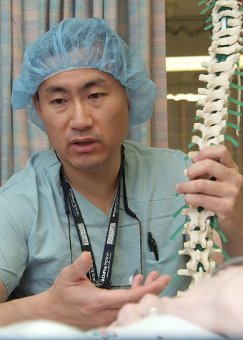Interventional Pain Treatments
Henry Ford offers a wide range of advanced, interventional pain treatments.

The Henry Ford Pain Center provides a wide range of diagnostic studies and pain treatments to help patients manage chronic pain conditions. All patients receive a personalized care plan based on their individual medical history, pain history, and current medical and pain condition. We offer many advanced, interventional pain management treatments, including:
Epidural injections
An epidural injection, also known as an epidural steroid injection, is a minimally invasive pain treatment used to address chronic back pain and neck pain that could result from several conditions. The procedure may provide pain relief for several months and sometimes permanently.
Facet joint injections
The facet joints of the spine connect individual vertebrae, provide stability and permit the spine to bend and twist. When these joints become swollen and irritated – from conditions such as spinal arthritis or other spinal conditions – it can cause neck and back pain. A facet joint injection is a minimally invasive pain management treatment used to target the problem joints, reduce swelling and relieve pain.
Nerve blocks
A nerve block is a minimally invasive pain treatment used to alleviate pain in a specific area of the body. Nerve blocks work by isolating specific nerves that are the source of the pain, and injecting an anesthetic near these nerves to numb them. This blocks the nerves from transmitting pain signals to the affected region.
Radiofrequency ablation for chronic and cancer pain
Radiofrequency ablation is a minimally invasive pain management treatment that uses a specialized radiofrequency needle to ablate, or destroy, targeted spinal nerve endings. The heat generated from the radio waves damages this nervous tissue, preventing the nerve from transmitting pain signals. With radiofrequency ablation, significant pain relief may be achieved for several months.
Neurostimulation
Neurostimulation, also known as neuromodulation, is a pain management treatment that uses electrical impulses to disrupt (or block) nerve impulses that cause pain. Depending on the type of neurostimulation, the electricity is delivered directly to the spinal cord (spinal cord stimulation) or to another area of the body (peripheral nerve stimulation or peripheral field stimulation). Neurostimulation therapy may help to reduce dependence on oral pain medications.
Peripheral joint injections
The peripheral joints include the knee, hip shoulder and other joints located on your limbs. When these joints become swollen and irritated – as the result of arthritis, bursitis, tendinitis and other conditions – they can cause pain. A peripheral joint injection is a minimally invasive pain treatment that targets the specific area of pain.
Trigger point injections
A trigger point is a knot of muscle fibers that results from strain or injury. When a trigger point forms, it can spread pain to other parts of the body. A trigger point injection is a minimally invasive pain management treatment that injects medication into the trigger point, relieving the muscle spasm and inflammation that is causing the pain.
Headache and facial pain treatment
When you experience chronic headaches, migraines or facial pain, it can significantly reduce your quality of life. Henry Ford Pain Management specialists offer advanced, interventional headache and facial pain treatments that use nerve blocks to target pain at the source.
Pain pumps (intrathecal pumps)
Pain pumps are a pain management treatment reserved for chronic, intractable cancer pain that does not respond to other therapies. In pain pump therapy, medication is delivered directly into the fluid that surrounds the spinal cord, using a small pump device that is surgically implanted under the skin. This type of pain treatment can better control chronic cancer pain symptoms while reducing dependence on oral pain medications.
The Henry Ford Pain Center approach
At the Henry Ford Pain Center, pain treatment begins with a thorough medical history and physical exam. All patients are evaluated by board-certified pain medicine physicians, physician assistants and certified nurse practitioners to identify the cause of their pain. Following initial assessment, we work with you to develop a personalized treatment plan that may include interventional pain procedures, medication therapy, physical therapy, massage and other complementary options.
.svg?iar=0&hash=F6049510E33E4E6D8196C26CCC0A64A4)

/hfh-logo-main--white.svg?iar=0&hash=ED491CBFADFB7670FAE94559C98D7798)